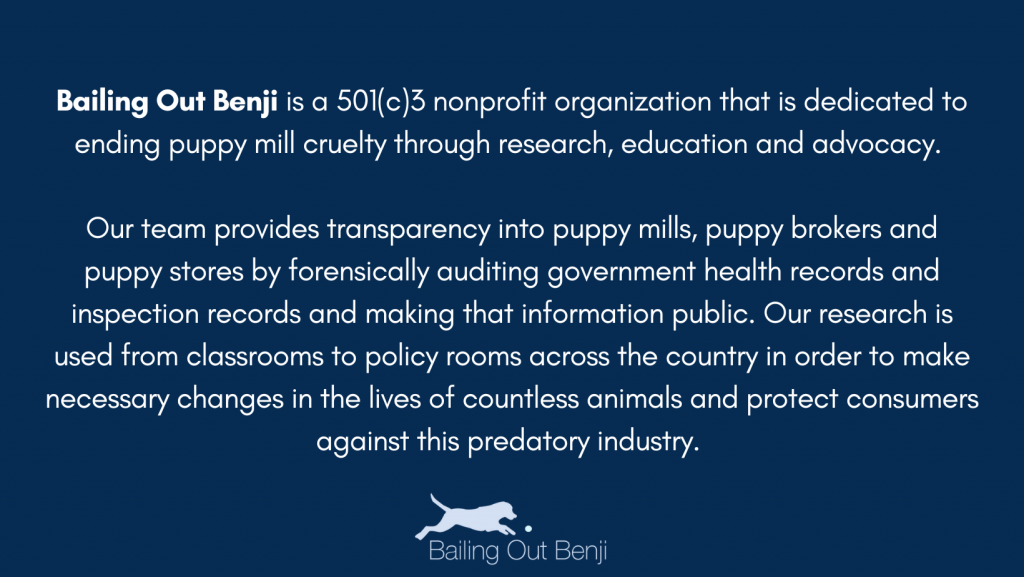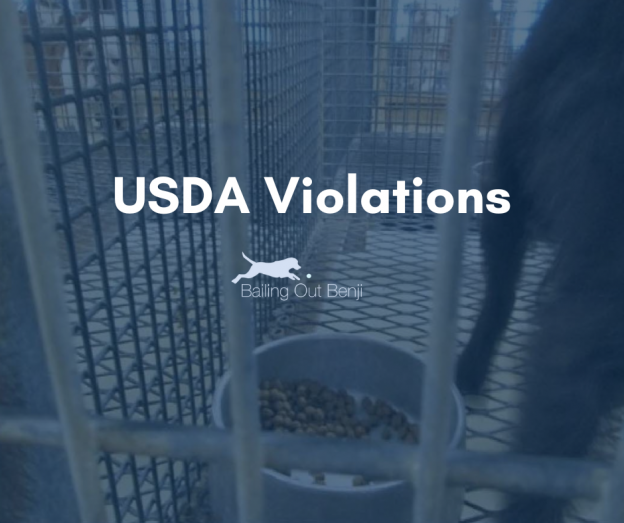
At Bailing Out Benji, we believe in the importance of providing transparency for the customer in an unbiased way. In order to accomplish this, we publish quarterly violation reports for USDA breeders and brokers who have violations during that time period. We do not insert our opinion in these reports, we just compile the data and publish the inspection reports for the public to view on their own. We are the only nonprofit that holds the commercial dog breeding industry accountable in this fashion.
To see our pet store and online broker research, click here
A brief history on the USDA:
It is important to note that the USDA has had numerous issues found during their three most recent audits performed by the Office of the Inspector General.
You can view the audits in full here: oig_audit_2010 oig_audit_2021 , 2025 APHIS_OIG_public
The 2025 Audit found the following areas of concern within the USDA’s dog breeder inspection program: Dog Breeders Remain Noncompliant With AWA Requirements and APHIS Did Not Timely Address Dog Breeder Complaints.
The 2021 Audit found the following areas of concern with the USDA’s dog breeder inspection program: Needs to Ensure the Reliability and Security of its Mission‐Critical Information System; Should Improve Controls Over Its Complaint Process
The 2010 Audit found the following areas of concern within the USDA’s dog breeder inspection program: Enforcement Process Was Ineffective Against Problematic Dealers; Inspectors Did Not Cite or Document Violations Properly To Support Enforcement Actions; New Penalty Worksheet Calculated Minimal Penalties; Misused Guidelines to Lower Penalties for AWA Violators; Some Large Breeders Circumvented AWA by Selling Animals Over the Internet; Security Controls Need to Be Addressed for AC’s New Information System; Did Not Adequately Establish Payment Plans for Stipulations
Methodology
According to the USDA: An inspection report documents an inspector’s observations and professional assessments of compliance at facilities regulated under the AWA. In each link below we have compiled a list of all of the USDA dog breeders and brokers that have had violations in that subsequent quarter.
Editors note: USDA inspectors have 5 days to give a copy of their inspection to the licensee and 30 days to publish their reports online. There may be additional facilities we add to this list once more inspection reports are added to the database.
We also include statistics on missed inspections, so we can monitor those facilities that are habitual offenders. The list below also only reflects dog and cat breeders and brokers (licenses A and B).
This list of violations below was obtained from the USDA APHIS search engine. Any pet store connections were obtained from various state departments of agriculture.
If you have any questions about the breeders listed on this report or our methodology for obtaining this information, please email our research analyst: Alexis Bell, research@bailingoutbenji.com
Definitions
Critical Violations:
A critical noncompliance (NCI) is a violation of the Animal and Plant Health Inspection Service (APHIS) regulations that has a serious or adverse impact on animal welfare.
Examples of critical NCIs include:
• all direct NCIs – as well as other NCIs that resulted in serious, adverse impacts on the welfare of an animal (including NCIs that occurred outside of the USDA inspection process);
• a facility that refuses to allow us to conduct an inspection;
• falsified records; and
• engaging in regulated activity with a suspended or revoked license.
Direct Violations:
A direct noncompliance item is a noncompliance that is currently (at the time of the inspection) having a serious or severe adverse effect on the welfare of an animal or has the high potential to have that effect in the immediate future – such as an animal with a broken leg that is not being treated by a veterinarian.
Non-Critical Violations:
A noncompliance that is not designated as a direct NCI is something that is not having a serious or severe impact on the welfare of an animal at the time of inspection – such as a clogged drain outside an animal enclosure.
More Information about Violations and USDA Inspections:
Direct, repeat and critical NCIs may result in more frequent USDA inspections.
A repeat NCI is something that was cited on a previous inspection report and should have already been corrected.
Three types of inspections – pre-license inspections, routine inspections and focused inspections.
A focused inspection is an unannounced inspection that, for a variety of reasons, does not cover the entire facility. For example, if we receive a public complaint regarding one particular animal in a facility, we will send an inspector to that facility to look into the matter.

